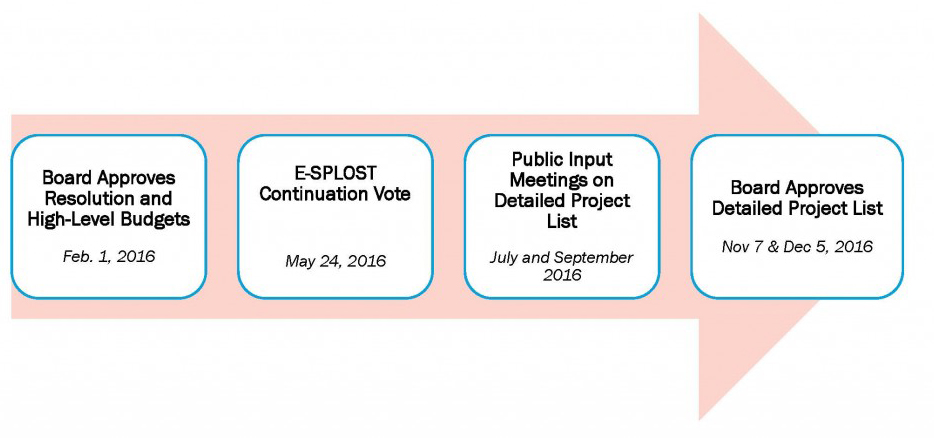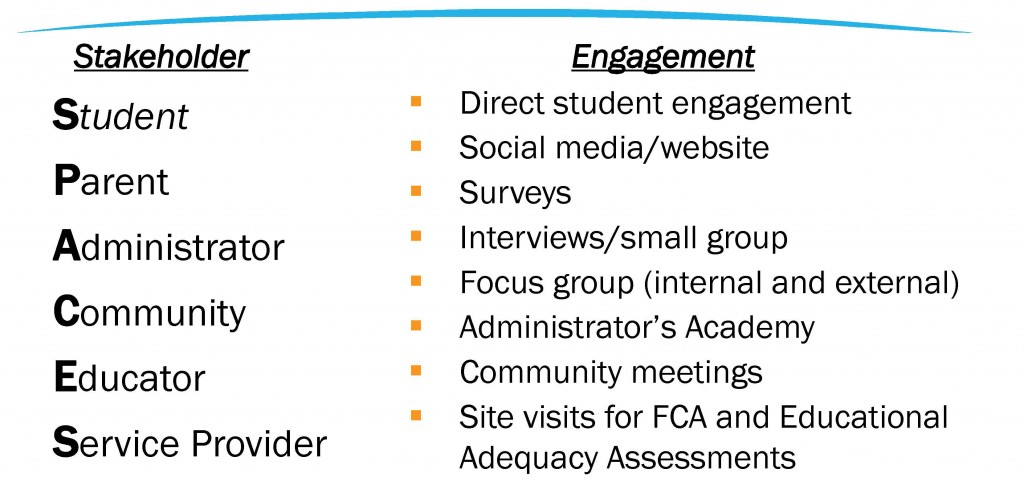Visit the E-SPLOST page for information on the October Public Meetings and the E-SPLOST Project List
 DeKalb County School District has launched the “Building S.P.A.C.E.S.” Initiative to determine how, where, and why future resources should be dedicated to the improvement and modernization of our buildings and infrastructure to support the District’s vision “to inspire our community of learners to achieve educational excellence.” This initiative helps support equity across all levels of the organization, in every school, and for every member of our district and community. Whether a space is for Student Growth, Parent Engagement, Administrator Leadership, Community Awareness, Educator Support or Service Delivery, S.P.A.C.E.S. needs to be a place where everyone is welcome and the success of all is paramount.
DeKalb County School District has launched the “Building S.P.A.C.E.S.” Initiative to determine how, where, and why future resources should be dedicated to the improvement and modernization of our buildings and infrastructure to support the District’s vision “to inspire our community of learners to achieve educational excellence.” This initiative helps support equity across all levels of the organization, in every school, and for every member of our district and community. Whether a space is for Student Growth, Parent Engagement, Administrator Leadership, Community Awareness, Educator Support or Service Delivery, S.P.A.C.E.S. needs to be a place where everyone is welcome and the success of all is paramount.
In the coming weeks and months, each of you will have a chance to participate in this exciting initiative. Your insight is important and, together, we will develop a clear path to the future.
The Building S.P.A.C.E.S. Initiative is made up of three main components:
Updates
5/25/2016
Revised Capacity Determination Guide and reports posted
4/29/2016
Facility Condition Assessment reports posted
3/11/2016
Facility Educational Adequacy Assessment scores and reports posted
2/12/2016
“What you need to know about the E-SPLOST vote On May 24, 2016” presentation posted
2/1/2016
Timeline updated
11/6/2015
Community Input Survey posted dcsd.questionpro.com
10/9/15
Upcoming community input meetings for October 2015
10/1/15
The Facility Condition Assessment (FCA) and Facility Educational Adequacy Assessment (FEAA) reports will be completed November/December 2015
9/02/15
Updated Facility Educational Adequacy Guide and Capacity Methodology Guide posted
8/06/15
Facility Educational Adequacy Guide and Capacity Methodology Guide posted
7/27/15
Schedule for Facility Educational Adequacy Assessment Site Visits posted
6/22/15
Building S.P.A.C.E.S Facility Condition Assessment Press Release
6/11/15
Building S.P.A.C.E.S website launch
6/11/15
Schedule for Facility Condition Assessment Site Visits post to website
Master Planning
DeKalb County School District’s Master Planning process includes an evaluation of all school and administrative facilities, as well as the infrastructure to support the educational mission of the District. This process includes gathering data about school facilities that will be used to develop priorities leading to the fifth consecutive Education Special Purpose Local Option Sales Tax (E-SPLOST V) project list.
The Master Planning process will occur in several phases, ending in the Spring of 2016. Major components of the process include:
E-SPLOST
Education Special Purpose Local Option Sales Tax (E-SPLOST)
As in the past, a joint resolution was approved between DeKalb County School District, the Atlanta Public Schools and the City Schools of Decatur for the approval of a project list to be presented to the voters via formal referendum in May of 2016. If approved by the voters of DeKalb County, E-SPLOST V sales tax collections would commence on July 1, 2017 and sunset on June 30, 2022.
“What you need to know about the E-SPLOST vote On May 24, 2016” Presentation
In the past, the primary source of local revenue available to most school systems for renovating and modifying existing educational facilities and the construction of new schools, was property tax. Two options were available:
- The local board of education (LBOE) could ask the voters to approve issuance of General Obligation Bonds to be repaid from property tax revenues.
- The LBOE had the option of using ad valorem tax revenues levied for the Maintenance and Operation (M & O) of schools to fund capital improvement projects.
Either of these options placed the burden for providing adequate local funding for capital improvements directly on property owners.
The constitutional amendment approved by the voters of Georgia in November 1996, allows LBOE’s the option of calling for a referendum to ask their voters to approve an E-SPLOST.
E-SPLOST is regulated by the State Constitution and state laws:
- Georgia Constitution Article VIII, Section VI, Paragraph IV
- O.C.G.A. § 48-8-110 through § 48-8-121
- O.C.G.A. § 48-8-140 through § 48-8-142 (Articles 3 and 4 of Chapter 8 of Title 48 of Official Code of Georgia annotated, as amended in 1997)
For more information on SPLOST and E-SPLOST, please see ACCG’s Guide for County Officials (5th Edition, 2013).
Stakeholder Engagement
Community Input Survey
DeKalb County School District held five (5) regional public input meetings on Tuesday October 20th through Thursday October 29th of 2015 to discuss and gather information related to the District’s E-SPLOST V master planning process called the “Building S.P.A.C.E.S.” Initiative. The “Building S.P.A.C.E.S.” Initiative is an effort to determine how, where, and why future resources should be dedicated to the improvement and modernization of our buildings and infrastructure to support the District’s vision “to inspire our community of learners to achieve educational excellence.”
It is critical that we get as much community input from the respective regions as we can in order to develop a comprehensive master plan and E-SPLOST V project list. If you weren’t able to attend the first round of community input meetings, a survey was provided up until December 4th, 2015 which contained the same questions from the regional input meetings.
DeKalb County School District is holding five (5) regional public input meetings, to discuss and gather information related to the E-SPLOST V planning called the “Building S.P.A.C.E.S.” Initiative. The “Building S.P.A.C.E.S.” Initiative is an effort to determine how, where, and why future resources should be dedicated to the improvement and modernization of our buildings and infrastructure to support the District’s vision “to inspire our community of learners to achieve educational excellence.”
Click here for the flyer for the community input meetings: English, Español – Spanish, বাঙালি – Bengali, Tiếng Việt – Vietnamese, ኣማርኛ – Amharic, Somali, Burmese, French, Arabic, Nepali and Hindi.
Region 1
Tuesday, October 20th
at 7 – 9 pm
Chamblee HS
3688 Chamblee-Dunwoody Road
Chamblee, GA 30341
Click here to view meeting
Region 2
Thursday, October 29th
at 7 – 9 pm
Tucker HS
5036 LaVista Road
Tucker, GA 30084
Click here to view meeting
Region 3
Tuesday, October 27th
at 7 – 9 pm
Stone Mountain HS
4555 Central Drive
Stone Mountain,
GA 30083
Click here to view meeting
Region 4
Monday, October 26th
at 7 – 9 pm
Miller Grove HS
2645 DeKalb Medical Parkway
Lithonia, GA 30058
Click here to view meeting
Region 5
Thursday, October 22nd
at 7 – 9 pm
Columbia HS
2106 Columbia Drive
Decatur, GA 30032
Click here to view meeting
DeKalb County School District is holding one informational and five (5) regional public input meetings, to discuss and gather information related to the E-SPLOST V planning called the “Building S.P.A.C.E.S.” Initiative.
Informational Meeting – September 27, 2016 Informational Meeting
Informational Meeting Presentation
In formational Meeting Handout
2nd Round of Regional Community Input Meetings
Informational Meeting at AIC Tuesday, September 27th in the AUD 7 PM – 9 PM
Region 1
Thursday, October 13th
at 7 – 9 pm
Chamblee HS
Directions
Region 2
Tuesday, October 4th
at 7 – 9 pm
Tucker HS
Directions
Region 3
Tuesday, October 18th
at 7 – 9 pm
Stone Mountain HS
Directions
Region 4
Tuesday, October 11th
at 7 – 9 pm
Miller Grove HS
Directions
Region 5
Monday, October 17th
at 7 – 9 pm
Columbia HS
Directions
Timeline
The Facility Master Plan process includes gathering data about school facilities that will be used to develop priorities leading to the Education-Special Purpose Local Option Sales Tax (E-SPLOST) detailed project list proposal that will go to the Board for approval in December 2016. This process will occur in several phases, starting the Spring of 2015 and continuing until the Spring of 2016. Throughout that time stakeholders will have multiple opportunities to provide input, give feedback, and help shape the plan.
The timeline for the Master Plan major work components is as follows:

Frequently Asked Questions
Data
| Facility/School | Type | Cluster | Region | FCA | FEAA | Enrollment | Capacity | |
|---|---|---|---|---|---|---|---|---|
| 1 | Adams Stadium Facility | Stadium | Druid Hills | 2 | 39.49 | |||
| 2 | Allgood ES | ES | Clarkston | 3 | 53.53 | 71.59 | 715 | 710 |
| 3 | Arabia Mountain HS | HS | M. L. King, Jr. | 4 | 98.15 | 84.98 | 1,414 | 1,582 |
| 4 | Ashford Park ES | ES | Chamblee | 1 | 48.93 | 55.79 | 720 | 496 |
| 5 | Austin ES | ES | Dunwoody | 1 | 46.40 | 59.77 | 729 | 564 |
| 6 | Avondale ES | ES | Druid Hills | 2 | 65.38 | 80.07 | 347 | 686 |
| 7 | Avondale Stadium Facility | Stadium | Druid Hills | 2 | 40.14 | |||
| 8 | Bethune, Mary McLeod MS | MS | Towers | 5 | 95.99 | 76.12 | 1,086 | 1,375 |
| 9 | Bob Mathis ES | ES | Southwest DeKalb | 4 | 54.33 | 62.58 | 534 | 578 |
| 10 | Bouie, Edward L. Sr. Theme ES | ES | M. L. King, Jr. | 4 | 65.22 | 77.16 | 779 | 853 |



